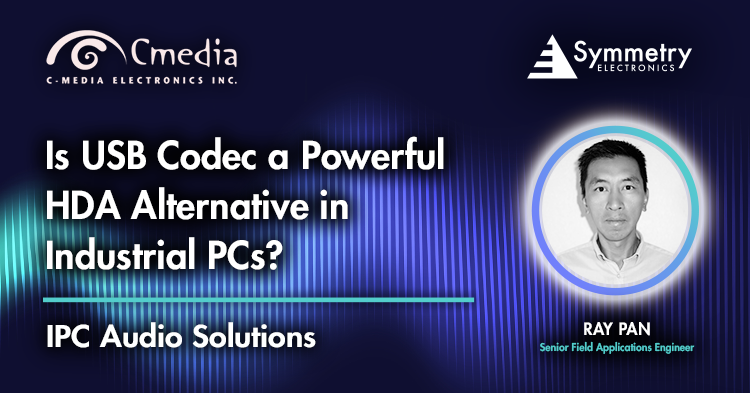- Home
- Braemac Blog
- Is USB Codec a Powerful HDA Alternative in Industrial PCs?
Is USB Codec a Powerful HDA Alternative in Industrial PCs?
IPC Audio Solutions
About Ray Pan

Within computing, particularly in PC environments, audio handling is a critical aspect that significantly impacts user experience. There are two distinct standards that govern how audio devices connect and communicate within computer systems: High-Definition Audio (HDA) and Universal Audio Classification (UAC), also known as USB Audio Classification.
Understanding HDA and UAC
Both UAC and HDA serve the purpose of enabling audio functionality within computer systems. However, each standard presents its own unique use cases and characteristics.
UAC operates as a USB-based audio standard and facilitates transmission through USB connection. It’s a plug-and-play solution, eliminating the need for specific driver installations. Most modern operating systems come equipped with in-box drivers that seamlessly support UAC devices, including Window, MacOS, Linux, and Android.
Conversely, HDA is more of an integrated solution found directly on the PC motherboard. It defines protocols and standards for integrating audio codec/controllers into the hub controller or CPU of the motherboard. Unlike UAC, HAD relies on drivers to operate, often necessitating the installation of specific vendor drivers on the operating system for proper functionality. Additionally, HDA commonly utilizes PCIe for the connection between the audio device and the motherboard.
Divergence in Design: Consumer PC vs Industrial PC Audio
While both HDA and UAC cater to audio needs in PCs, the design approach can significantly differ between consumer and industrial PC (IPC) audio. Consumer PC audio implementations often prioritize high-fidelity audio playback and low-latency performance, making them ideal for activities like music playback and gaming. IPCs, on the other hand, focus more on reliability, noise immunity, EMI protection, and longevity of life cycle. While some IPCs may require basic sound output, few need support for high-fidelity audio for communication purposes.
Installation and Maintenance Complexity
One notable difference between PCIe-based HDA devices and USB-based UAC devices lies in installation/maintain complexity. PCIe devices requires installation into expansion slots on the motherboard, which can lead to system downtime during installation, driver installation, and BIOS updates. This necessitates additional technical expertise for the service personnel.
On the contrary, USB audio devices are generally more portable and offer more flexibility for installation. They are also hot-swappable, allowing for connection or disconnection without system down time for plug-and-play experience.
Power Efficiency Considerations
From a power efficiency perspective, USB peripherals must operate within the limits of associated USB specifications and offer several power states. In contrast, PCIe is intended for high-performance usage where power consumption is less of a concern.
How Cmedia is Innovating the IPC Market
Cmedia, a fabless semiconductor company specializing in USB audio solutions, has emerged as key player in the IPC market in recent years. Their comprehensive UAC1.0/2.0 audio solutions are tailored for diverse needs, ranging from cost-effective options like the HS-100C where simple sound device and a plug-and-play software environment is preferred to the versatile CM6542. The CM6542 offers enhanced customization capabilities through embedded MCU and flash memory integration.
Another plug-and-play IPC audio solution is offered through Cemdia’s CM102S+. This compact all-in-one chip eliminates the need for external components and reduces costs. Unlike the HS-100C or CM6542, the CM102+ focuses solely on output audio, bypassing the need/added expense of input components.
For applications demanding audio quality or advanced features, Cmedia provides solutions with integrated hardware DSP. These solutions support features such as AEC, ENC, and NR.
In addition to performance and cost considerations, Cmedia prioritizes the longevity of product cycles when selecting components for indutrials PCs. With a 10-year long-term supply commitment, Cmedia simplifies decision-making, ensuring sustained support and reliability for their IPC solutions.


